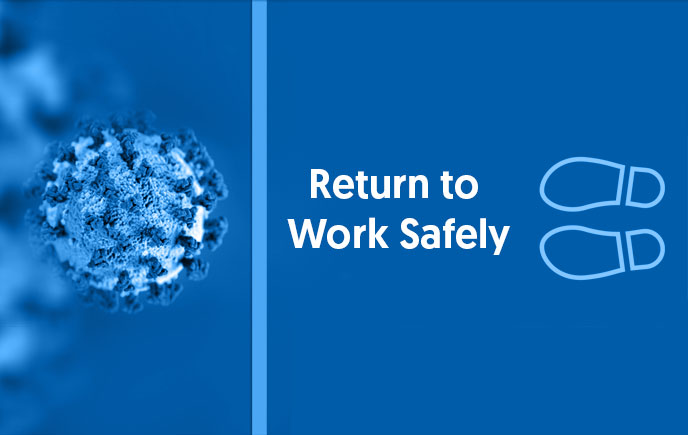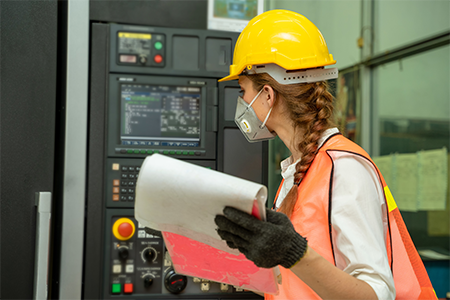Full steam ahead - Scottish distillery with Grundfos
There’s steam and there’s high-quality steam. There are pump solutions and intelligent pump solution...
After what to most of us seems like an eternity, we’re gradually beginning to emerge from the constraints of a nationally imposed COVID-19 lockdown. This process however is unlikely to be fast. The Government is talking about a phased restarting of the economy, with some sectors being encouraged to return to work before others, but at the time of writing has still to announce a firm timetable.

This has drawn criticism from across industry with, for example, Adam Marshall, Director General of the British Chambers of Commerce, commenting in the Financial Times on April 22nd, “There is already confusion on the ground. We want some answers to the big questions around the timeline – will we have enough notice?” [to plan for a restart to operations].
There has also been criticism from business organisations including the CBI and the BCoC that the Government is failing to provide clear guidelines or examples of best practice to employers to help them protect employees, while restarting their businesses efficiently.

A leaked draft of a plan being prepared by Business Secretary Alok Sharma seems to indicate that measures might include an end to hot desking, the use of floor-tape to keep workers 2m apart, the adoption of face masks in the workplace and an instruction to employers to find alternatives to keypads and touchscreens. Some of these measures will be easier to implement and enforce than others; for example, preventing the use of touchscreens will be impractical for all those manufacturers that operate machine tools with the latest controllers however there are solutions to many of these challenges.
Inevitably, whatever the nature of guidelines that may or may not be published in coming weeks by Government or trade bodies, it will be up to individual companies to interpret and apply them in a way that best suits the unique needs of their businesses. In turn, this will require an approach that combines a large degree of common sense with existing health and safety policies, together with appropriate consultation with employees and, if present, local trade union representatives.
Managing a return to work and a restart to manufacturing begins with a detailed plan that covers all aspects of a company’s activities. Hopefully industrial business will have spent the weeks of lockdown developing suitable plans, including consideration of factors such as:
The health and safety of employees has always been a primary business commitment for industrial companies. If anything, COVID-19 will intensify this focus, with the need for employee safety being balanced against the need to restart production operations as efficiently as possible.
Developing an effective plan that addresses these criteria needs to consider:
It’s also important to remember that some employees will be more concerned than others about returning to a workplace where there may be a perceived risk to their health from the transmission of COVID-19. Clearly stated and communicated health and safety policies, together with the implementation of the obvious physical measures listed above is therefore essential.
So too is an assessment of those employees who may fall into one of the more vulnerable categories, while those who are most apprehensive about the new working conditions or expectations placed on individual employees may require a degree of counselling.

All of this will be a challenge to manufacturers struggling to adapt to new ways of working. This is where the support of ERIKS can play a crucial role.
In recent weeks, we’ve been working with our supply chain partners to develop a range of critical Back-to-Work essentials. This range contains everything needed to help manufacturers source the essential products for personal hygiene, PPE, cleaning equipment and chemicals, and social distancing.

We’ve also been working with our customers to provide both essential health and safety products and technical advice and support. For example, we have helped many customers in key industries such as the food and pharmaceutical sectors, that needed to maintain production capacity while protecting their staff, develop effective employee protection plans, supplied all the equipment they needed and helped with its implementation, sometimes within just 48 hours.
Engineers will generally agree that production lines and systems are at their most reliable when they are in constant operation, with regular maintenance. Prolonged shutdowns often lead to unexpected failures. Even systems that have been kept ‘warm’ during lockdown may be prone to problems as they are brought back up to speed.

Assessing machine health should form part of the restart planning process. Using service histories and the most up to date information from predictive maintenance systems will help to identify potential risks. These risks then need to be managed in conjunction with a key supplier such as ERIKS, to ensure that stocks of essential replacement parts are immediately available and that specialised maintenance skills can be brought in to supplement in-house teams.
Restarting your manufacturing operation is also likely to require a reassessment of your supply chain. Right now, it’s likely that vital components are unavailable if overseas suppliers’ factories are still inoperative, parts are held up at ports or are still transit. This is where local suppliers such as ERIKS come into their own, with stockholdings of standard parts and the capability in areas such as seals and gaskets to manufacture special parts quickly and in both small or large volumes.
In time, you may also find that local sources of supply prove more reliable and cost-effective than those that have traditionally been used at the end of extended global supply chains.
As one of the Government’s many COVID-19 initiatives, although not one that has been widely publicised, the level of VAT levied on certain items of PPE, including masks, respirators, aprons and disposable gloves has been reduced to zero until the end of July.
This is just one example of the unprecedented amount of help available to support businesses throughout industry. This support is likely to continue for the immediate future, as the Government begins to ease lockdown, stabilise the economy and stimulate a return to growth.
Ultimately, it is up to individual companies to ensure that they have the systems and infrastructure in place to enable them once more to prosper; and this journey begins with effective restart planning and, most importantly, establishing the processes that will enable employees to work safely, comfortably and productively in what for many may be a strange new world.
Get the latest updates from ERIKS including:
Choose any or all of these via the ERIKS Subscription Centre!
Our Know+How brings together the best of the latest Know+How Hub articles in one easy to digest magazine, covering the following topics:
That's why its the leading magazine for maintenance engineers from ERIKS.
Want Know+How Magazine delivered direct to your door? Visit the ERIKS Subscription Centre to opt-in!
Take a look at our latest updates...
There’s steam and there’s high-quality steam. There are pump solutions and intelligent pump solution...
Looking for a custom Product quote? Need an answer to a Technical question? Looking for Careers/HR support? Want to work with us? Interested in our Digital Trading solutions? Have a finance question? Send us your enquiry and a member of the ERIKS team will be with you quickly.
We strive to deliver exceptional quality service and products. As part of this goal, we encourage customers to submit feedback on their experiences so we can resolve any issues and concerns.
At ERIKS we strive to deliver the best quality service and products. As part of this goal we encourage customers to submit feedback on their experiences so we can resolve any issues and concerns.
Call us: +441215086000
